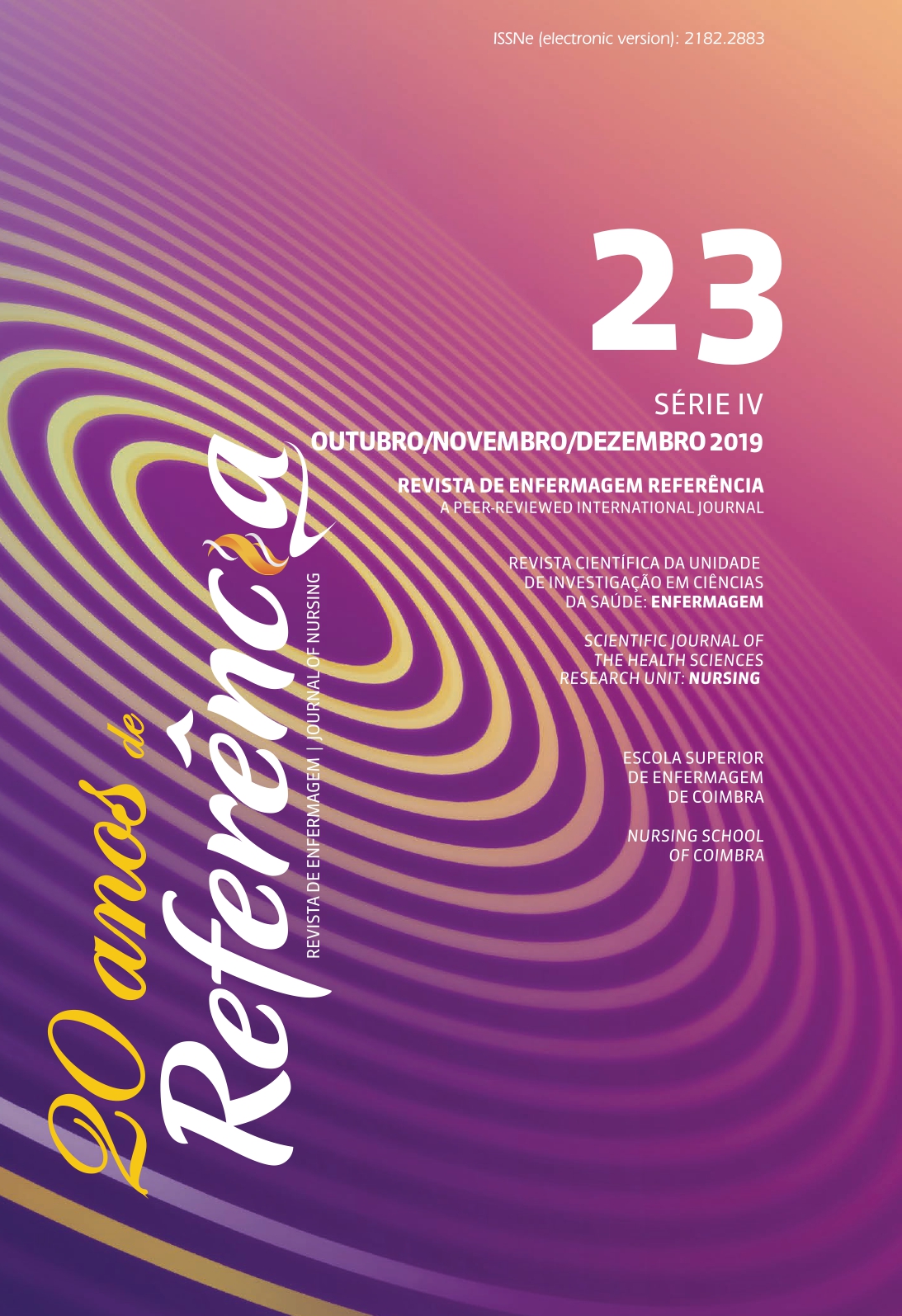Nursing therapies in the person with post-stroke dysphagia
DOI:
https://doi.org/10.12707/RIV19057Keywords:
stroke, swallowing, nursing care, information systemsAbstract
Background: Dysphagia is one of the complications of stroke, with a severe impact on the person’s capacity to recover autonomy, and severe respiratory, nutritional, and psychological complications.
Objective: To identify the foci/diagnoses and interventions, documented by nurses, in response to the care needs of the person with post-stroke dysphagia.
Methodology: An exploratory, descriptive, and retrospective study was conducted in an inpatient service of a rehabilitation center, using descriptive statistical analysis in nursing documentation between January and May 2019.
Results: The diagnoses most frequently documented are related to self-care (53.9%), and the most documented interventions are of the observing type (49.2%). Documentation of swallowing-related diagnoses and interventions is scarce.
Conclusion: There are interventions directed at this focus in nursing care to the person with post-stroke dysphagia, regardless of the documented diagnoses. The results suggest that, although they constitute a focus of attention in nursing practice, their documentation is limited.
Downloads
References
Abreu, W., Barroso, C., Segadães, M. F., & Teixeira, S. (2015). Promotion of self-care in clinical practice: implications for clinical supervision in nursing. International Journal of Information and Education Technology, 5(1), 6-9.
Cohen, D. L., Roffe, C., Beavan, J., Blackett, B., Fairfield, C. A., Hamdy, S., ... Bath, P. M. (2016). Post-stroke dysphagia: a review and design considerations for future trials. International Journal of Stroke, 11(4), 399–411. doi:10.1177/1747493016639057
Conselho Internacional de Enfermeiros. (2016). CIPE® Versão 2015 - Classificação Internacional para a Prática de Enfermagem. Loures, Portugal: Lusodidata. Recuperado de https://futurosenf.files.wordpress.com/2017/04/cipe_2015.pdf
Direção-Geral da Saúde. (2017). Programa nacional para as doenças cérebro-cardiovasculares. Lisboa, Portugal: Autor.
Dziewas, R., Beck, A. B., Clave, P., Hamdy, S., Heppner, H. J., Langmore, S. E., ... Wirth, R. (2017). Recognizing the importance of dysphagia: stumbling blocks and stepping stones in the twenty-first century. Dysphagia, 32(1), 78–82. doi:10.1007/s00455-016-9746-2
Hines, S., Kynoch, K., & Munday, J. (2016). Nursing interventions for identifying and managing acute dysphagia are effective for improving patient outcomes: a systematic review update. Journal of Neuroscience Nursing, 48(4), 215–223. doi:10.1097/JNN.0000000000000200
Krishnamurthi, R. V., Moran, A. E., Feigin, V. L., Barker-Collo, S., Norrving, B., Mensah, G. A., ... Roth, G. A. (2015). Stroke prevalence, mortality and disability-adjusted life years in adults aged 20–64 years in 1990–2013: Data from the global burden of disease 2013 study. Neuroepidemiology, 45(3), 190-202. doi:10.1159/000441098
Machado, N. B. (2013). Gestão da qualidade dos cuidados de enfermagem – um modelo de melhoria contínua baseado na reflexão-ação (Tese de doutoramento). Universidade Católica Portuguesa, Instituto de Ciências da Saúde do Porto, Portugal. Recuperado de https://repositorio.ucp.pt/bitstream/10400.14/14957/1/Nat%C3%A-1liaMachado%20-%20Gest%C3%A3o%20da%20qualidade%20dos%20cuidados%20de%20enfermgem%20Um%20modelo%20de%20melhoria%20cont%C3%ADnua%20baseado%20na%20reflex%-C3%A3o%20a%C3%A7%C3%A3o.pdf
Meleis, A., Swayer, L., Im, E., Hilfinger, D., & Schumacher, K. (2000). Experiencing transitions: An emerging middle-range theory. Advances in Nursing Science, 23(1), 12-28. Recuperado de https://journals.lww.com/advancesinnursingscience/pages/articleviewer.aspx?year=2000&issue=09000&article=00006&type=abstract
Mota, L., Bastos, F. & Brito, M.A. (2018). A pessoa submetida a transplante de fígado: Terapêuticas de enfermagem no follow-up. Revista de Enfermagem Referência, 4(16), 19-28. doi:10.12707/RIV17086
Ordem dos Enfermeiros. (2007). Resumo mínimo de dados e core de indicadores de enfermagem para o repositório central de dados da saúde. Lisboa, Portugal: Autor. Recuperado de https://www.esenfcvpoa.eu/wp-content/uploads/2012/03/RMDE.pdf
Ordem dos Enfermeiros. (2012). Padrões de qualidade dos cuidados de enfermagem: Enquadramento conceptual enunciados descritivos. Lisboa, Portugal: Autor. Recuperado de https://www.ordemenfermeiros.pt/media/8903/divulgar-padroes-de-qualidade-dos-cuidados.pdf
Padilha, J.M. (2013). Promoção da gestão do regime terapêutico em clientes com DPOC: um percurso de investigação-ação (Tese de doutoramento). Universidade Católica Portuguesa, Instituto de Ciências da Saúde do Porto, Portugal. Recuperado de https://repositorio.ucp.pt/handle/10400.14/14958
Takizawa, C., Gemmell, E., Kenworthy, J., & Speyer, R. (2016). A systematic review of the prevalence of oropharyngeal dysphagia in stroke, parkinson’s disease, alzheimer’s disease, head injury, and pneumonia. Dysphagia, 31(3), 434–441. doi:10.1007/s00455-016-9695-9
Wirth, R., Dziewas, R., Beck, A., Clavé, P., Hamdy, S., Heppner, H. J., ... Volkert, D. (2016). Oropharyngeal dysphagia in older persons: - from pathophysiology to adequate intervention: a review and summary of na international expert meeting. Clinical Interventions in Aging, 11, 189-208. doi:10.2147/CIA.S97481






















